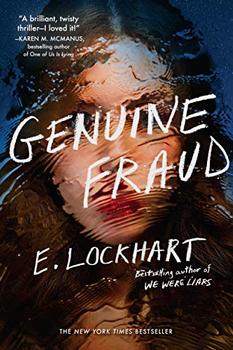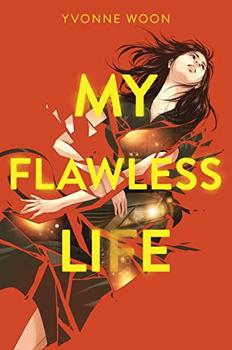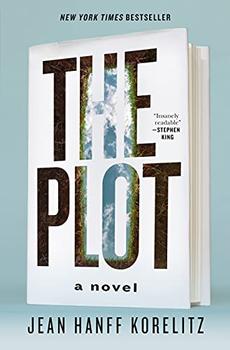Summary | Excerpt | Reviews | Beyond the book | Read-Alikes | Genres & Themes | Author Bio

Critics' Opinion:
Readers' Opinion:
First Published:
Sep 2017, 288 pages
Paperback:
May 2019, 288 pages
 Book Reviewed by:
Book Reviewed by:
Michelle Anya Anjirbag
Buy This Book
Do we ever really know who our friends are? Or what the truth is? After all, truth, like beauty is often in the eye of the beholder, but whose gaze are we meant to trust? Those are only a few of the questions that E. Lockhart asks her readers to grapple with in her thriller, Genuine Fraud.
When we meet Jule, she is an international nomad, obviously keeping to herself, and on the run – though we don't know who she is, why she is in trouble, or where she is going. All we do know is that there were two people in her life who gave her a sense of security, and one of those people was Imogen. At first we think that Imogene was perhaps a sister, or a mentor who took a parental role in Jule's life, but as the narrative unfolds in reverse, we start to question the true nature of this relationship. By the time we hear Imogene speak in her own voice at all, well, we are left wondering who, exactly, is Jule?
The novel's narrative is absolutely driven by Jule's character, and how she wields stories about herself and her relationships. There is something deliciously pathological in her manipulation – we recognize it, the need to control and manage an image and tell a certain story. The effect is unsettling, but just enough to keep us guessing at what the truth is, and whether or not we will ever know it. Because the narrative unfolds backwards and nonlinearly, the reader is destabilized within the text; usually a reader becomes more invested in the character as the plot unfolds, but here, the more we learn about Jule the less we want to support her.
Each scene removes another layer of the persona we were first introduced to, and what we begin to see is something that we cannot define but have to nonetheless question. Is this simply someone so desperate to change her circumstances she will become anyone and anything as needed? Is there something deeper, more pathological at work? This is never answered, but, perhaps it doesn't need to be. What matters most is that Jule is willing to do anything to keep the world she constructed intact, and as the bodies fall, the truth becomes much darker than any of the fantasies. Also important is how plausible the unplausible becomes through this text; while the odds of befriending a carefree billionaire heiress are miniscule, it is easy to see how and why Jules is so successful at cozying up to someone and stepping into their lives. The niggling feeling that this could happen in the world outside the text gives this thriller its strength.
Readers will fly through Lockhart's snappy prose; though the plot structure unfolds nontraditionally, the pacing facilitates understanding and makes each revelation manageable to follow. The dialogue, as well as Jule's internal monologue, walk the very narrow line of being formulaic, and in places does cross over into the patterns that genre fiction and thrillers are known for. But because it is tough to anticipate the plot of this story, we are still left coming out on the other side feeling like we've read something unique. Though classified as a young adult novel, Genuine Fraud will thrill all readers and force us all to question some of the darker sides of human nature.
![]() This review was originally published in The BookBrowse Review in September 2017, and has been updated for the
May 2019 edition.
Click here to go to this issue.
This review was originally published in The BookBrowse Review in September 2017, and has been updated for the
May 2019 edition.
Click here to go to this issue.

If you liked Genuine Fraud, try these:

by Yvonne Woon
Published 2023
Yvonne Woon, author of If You, Then Me, has crafted a slow-burn thriller about fixing—our friends, ourselves, and our complicated pasts. For fans of Allegedly and We Were Liars, My Flawless Life features a compelling narrator who grapples with the secrets of her private school classmates as well as her own life.

by Jean Korelitz
Published 2022
Hailed as "breathtakingly suspenseful," Jean Hanff Korelitz's The Plot is a propulsive read about a story too good not to steal, and the writer who steals it.





The Flower Sisters
by Michelle Collins Anderson
From the new Fannie Flagg of the Ozarks, a richly-woven story of family, forgiveness, and reinvention.

The House on Biscayne Bay
by Chanel Cleeton
As death stalks a gothic mansion in Miami, the lives of two women intertwine as the past and present collide.

The Funeral Cryer by Wenyan Lu
Debut novelist Wenyan Lu brings us this witty yet profound story about one woman's midlife reawakening in contemporary rural China.
Your guide toexceptional books
BookBrowse seeks out and recommends the best in contemporary fiction and nonfiction—books that not only engage and entertain but also deepen our understanding of ourselves and the world around us.